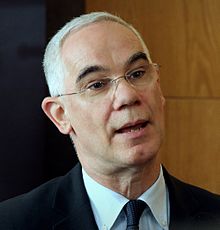2017 Hungarian presidential election
[4] Since 2012, several journalists and political scientists had assumed that Viktor Orbán intended to move from his position as prime minister to become head of state at the next presidential election.
As Népszabadság author Ildikó Csuhaj quoted an anonymous source in her article dated 21 May 2014, the "role of head of state, representation of a united nation is not just a momentary desire, but a realistically thought out option", and "this is a dilemma for the Prime Minister for the time being".
Following the resignation of Schmitt in April 2012, Orbán told a conference at the Supreme Court that "there were numerous arguments for a presidential system" during the constitutional process in 2011, but in the event they did not adopt that "for historical and law-abiding reasons".
He said in his speech that he was ready to lead the party into the forthcoming parliamentary election and to continue to serve as prime minister if Fidesz wins re-election in 2018.
[13] In contrast to Schmitt, who during his presidency of almost two years did not send any bill which had been voted on by the National Assembly back for consideration by the legislature, nor submit any to the Constitutional Court for judicial review, János Áder proved to be a counterweight to the Orbán government on a number of important issues.
[14] Despite Miklósi's remarks, the above disagreements, primarily the rejection of electoral registration and the reclassification of MNB public funds, were serious political setbacks for Prime Minister Viktor Orbán, who, as a result, seriously considered the replacement of Ádár by a more obedient candidate in the 2017 presidential election.
The website noted that Orbán personally opposed Áder's nomination, and wanted a non-politician in his place, for instance academics József Pálinkás or Szilveszter E.
[21] On 8 December 2016, the opposition ATV claimed that Calvinist pastor and Minister of Human Resources Zoltán Balog had been selected by Orbán and the party leadership as successor to Áder as President of Hungary.
The news portal added that the passive attitude of Áder during the October 2016 migrant quota referendum campaign was also harmful for the "relationship of trust" between him and Orbán.
ATV also referred to the government's dilemma: was it appropriate to elect a Calvinist President (Balog), with the incumbent prime minister (Viktor Orbán) and House Speaker (László Kövér) also belonging to that ecclesiastical community, despite Hungary's Catholic majority?
[24] On 21 December, ATV reported that Orbán had requested from the party leadership the official nomination of János Áder as president, during an external[clarification needed] meeting in Dobogókő.
Dull argued that Áder had in the event not caused "big trouble" during his first term, and so his re-election "did not represent a significant political risk" to Orbán.
[28] On 5 January 2017, left-wing liberal portal 444.hu reported that several members of the Fidesz presidency, primarily László Kövér and Gergely Gulyás, had succeeded in convincing Orbán at the Dobogókő meeting to choose Áder rather than Balog.
Majtényi had served as Parliamentary Commissioner for Privacy (1995–2001) and President of the National Radio and Television Commission (ORTT) (2008–09), and held the position of Director of the Eötvös Károly Institute NGO during the candidature.
Thirty-nine intellectuals and well-known public figures had signed the petition by 2 January 2017, including László Z. Bitó, János Bródy, Kinga Göncz, Ágnes Heller and Lajos Parti Nagy.
[35] LMP decided to support Majtényi's nomination "in the light of the present realities" on 3 February, but also argued in favour of introduction of a direct presidential election system.
[40] In April 2016, the far-right Jobbik party initiated a constitutional amendment to adopt a direct presidential election system, arguing that this would increase the president's legitimacy.
Opposition politicians claimed that the government wanted to avoid giving Majtényi the opportunity to contest the election on the national day of the 1848 Revolution.
[48] While János Áder remained completely passive during the so-called campaign period (from December 2016, he gave no interviews), László Majtényi visited all county seats and held public forums.
[51] László Majtényi come out in favor of independent institutions against "human capriciousness", emphasizing corruption, poverty and the Orbán government's numerous controversial measures.
He added that Orbán followed the theory of Machiavelli, when defines[clarification needed] a common enemy, for instance migrants, liberals or George Soros.

